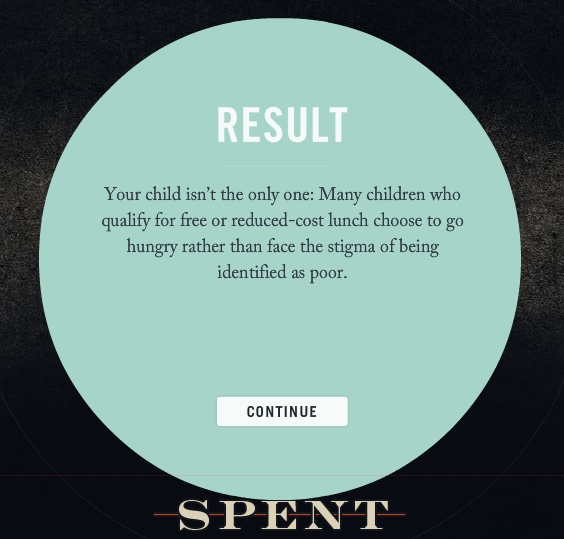Spent: Choose Your Own Misadventure
I just spent a few minutes “playing” Spent, a website which simulates what it’s like to be low-income and face difficult choices regarding housing, family, transportation and work:
Work hard. Do the right thing. Homelessness is something that will never happen to me. Sometimes, all it takes is one life-changing experience to land you on the streets: a job loss, death of a loved one, divorce, natural disaster, or serious illness.
That message is everywhere, but it’s easy to ignore– and that’s the point of this simulation. The site is programmed to serve up realistic challenges that force players to make extremely difficult decisions– like paying for cafeteria food you can’t afford because your hypothetical child complains about the stigma of free lunches or putting a pet to sleep because you can’t afford the treatment that would save its life.
In the case of the former, after a choice is made between coming up with $3 per day for lunch money, or taking the risk of your child starving to avoid the shame of accepting free food, a screen like this pops up:

One of the many "consequence" screens used to illustrate the plight of low-income Americans in "Spent".
It may seem obvious or logical that low-income folks who go without car or health insurance often end up losing the money they are desperately trying to save, but those pop-ups do an excellent job of conveying the reality of such a hardscrabble existence.
While Spent has made the national news and is the product of a faith-based agency in North Carolina, I decided to share it here because the challenges this decision-based game describes occur everywhere, including D.C. For me, playing the game resulted in a sobering realization; even when I was unemployed and struggling with choices about transportation, health or housing, I was still considerably more privileged than the hypothetical single parent who trudges through Spent’s various scenarios, disappointing family members while rarely making ends meet.
-
Anon
-
http://twitter.com/AlyciadotJ Alycia






